Struggling with writer’s block? Novels gathering digital dust? You’re not alone.
Meet Sudowrite: The AI story generator that’s got writers like us excited…
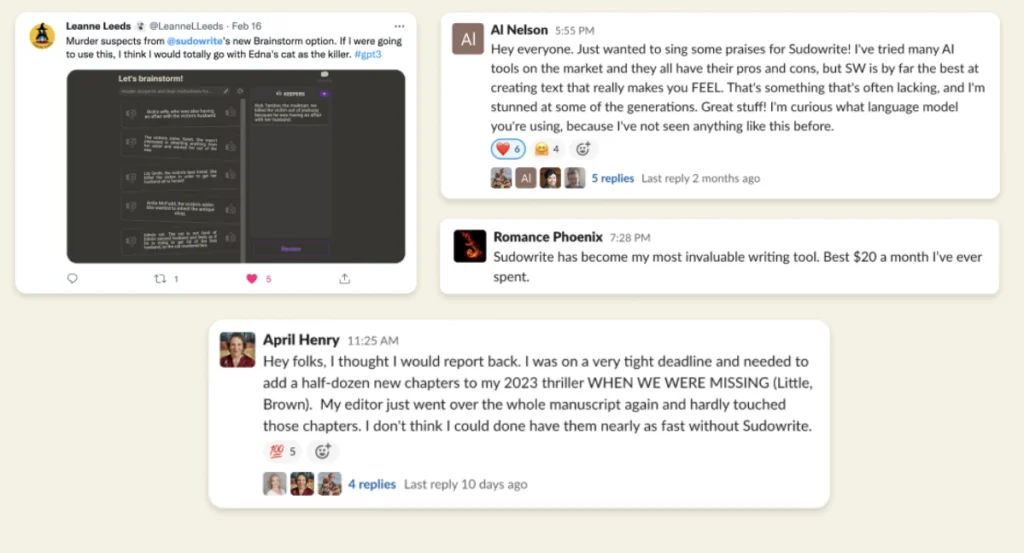
But, can it really silence that taunting cursor for good?
In this in-depth Sudowrite review, you’ll get:
- A breakdown of key features
- Transparent pricing info to help you select the best plan
- Real-world testing on 3 different stories
Let’s dive in.
The Bottom Line
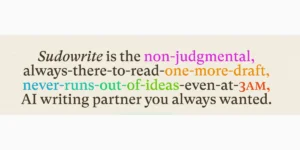
Sudowrite is THE best tool for fiction writers. With features like Rewrite, Describe, Brainstorm, Canvas, and Character Generator, it helps you beat writer's block and finish stories faster. Less restrictive than ChatGPT and Claude, it writes human-like stories, matches your style, and gives AI feedback. One drawback: No plagiarism checker.
Price: 19
Price Currency: USD
Operating System: Web App
Application Category: AI Writing Tool
4.5
Pros
- Brainstorm Feature - Beat writer's block with AI-generated characters, worlds, and plots.
- Canvas - Organize your story visually, replacing scattered notes.
- Guided and Auto Modes - Fine AI control to suit your personal writing style.
- Expand Plot Points - Explore multiple scenarios.
- Rewrite - AI rewrites to 'Show not Tell'
- Describe - Bring scenes to life in all five senses, even your weak points.
- Generate Twists - Get new ideas to keep readers hooked
- AI Book Blurbs and Hooks - Save time and effort in marketing.
- AI Feedback - Get quick critiques without needing beta readers.
- ~4000-Word Free Trial - Try Sudowrite risk-free.
- Uses fine-tuned GPT 3.5, Claude, GPT-4, Mistral Medium - the most advanced AIs with extra magic
- Unused AI credits rollover (only in MAX plan)
Cons
- Lacks in-built plagiarism checker.
Stories I generated with Sudowrite:
Story 1: A writer takes help from a robot (demonstrates key features)

Story 2: A town where vampires & zombies co-exist (Shows AI feedback feature)
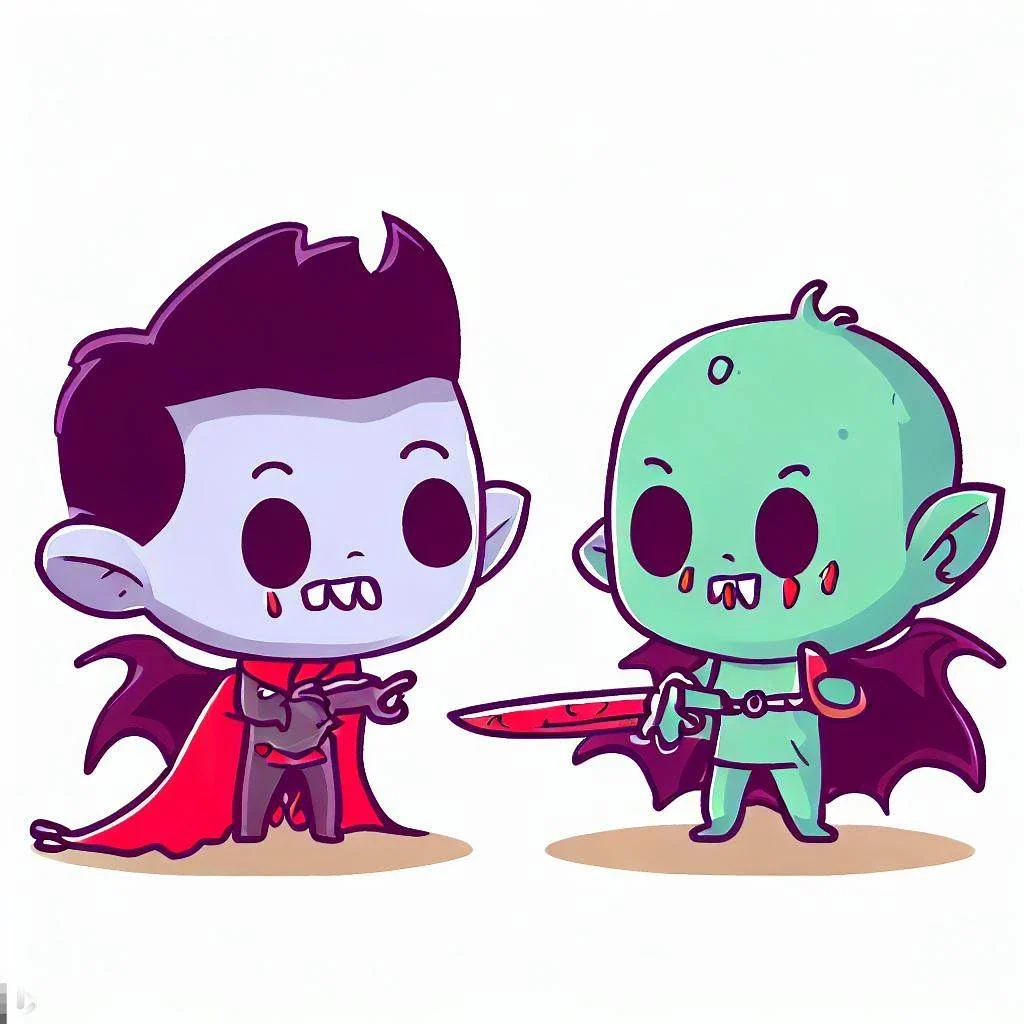
Story 3: A love story between a vampire and an AI (mixing sci-fi and folklore)

My Criteria for a Good AI Story Writing Tool
A good AI story writing tool should assist the writer in brainstorming and refining initial drafts. Here are my criteria:
- The output must be coherent and original.
- The tool should stay true to the writer’s personal style provided as input.
- There should be a focus on storytelling tools, such as brainstorming and world-building, rather than generic AI writing.
- The tool should offer a large number of AI-generated words at reasonable prices, as we’ll likely want to iterate a story idea multiple times to get it just right.
- A distraction-free interface is essential for writing.
For me, Sudowrite checks all these boxes ✅.
How to Use Sudowrite? (Best Features)
These are some of my favorite Sudowrite features (click the links to jump ahead):
- 1. Brainstorm: Get Inspired
- 2. Canvas: Your Storyboard
- 3. Expanding Plots, Write & Rewrite Features
- 4. Describe Story Elements
- 5. Generating a Story Twist: Expect the Unexpected!
- 6. Feedback on Your Writing: AI as Your Beta Reader
- 7. Shrinkray: Crafting the Perfect Blurb
- 8. Story Engine: Finish Long-Stalled Novels
1. Brainstorm: Get Inspired
Sudowrite offers a comprehensive brainstorming suite that covers every aspect of story writing, starting from a single sentence.
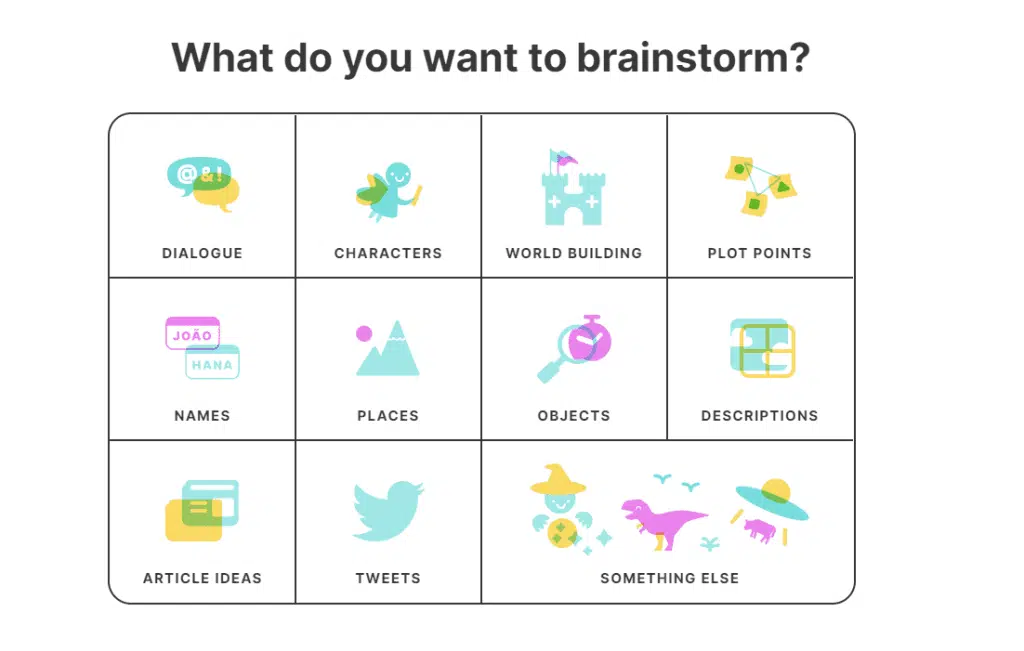
I put these features to the test to see if they genuinely add value.
Story #1: A Writer Taking Help from a Robot to Write (how meta!)
For this test, I asked Sudowrite to brainstorm a character: “a writer who takes help from a robot to write.” The result? Sudowrite’s brainstorming feature provided me with dozens of creative and helpful ideas.
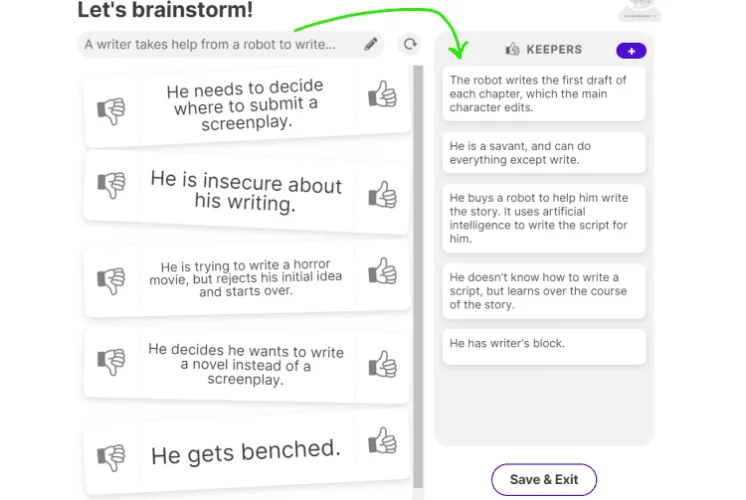
2. Canvas: Your Storyboard
Sudowrite’s Canvas feature allows you to organize your thoughts, characters, and story points. One standout feature is its ability to visualize characters. For example, I visualized an antagonist in one of my stories as a guy with a blue hat and a pointed, evil chin.
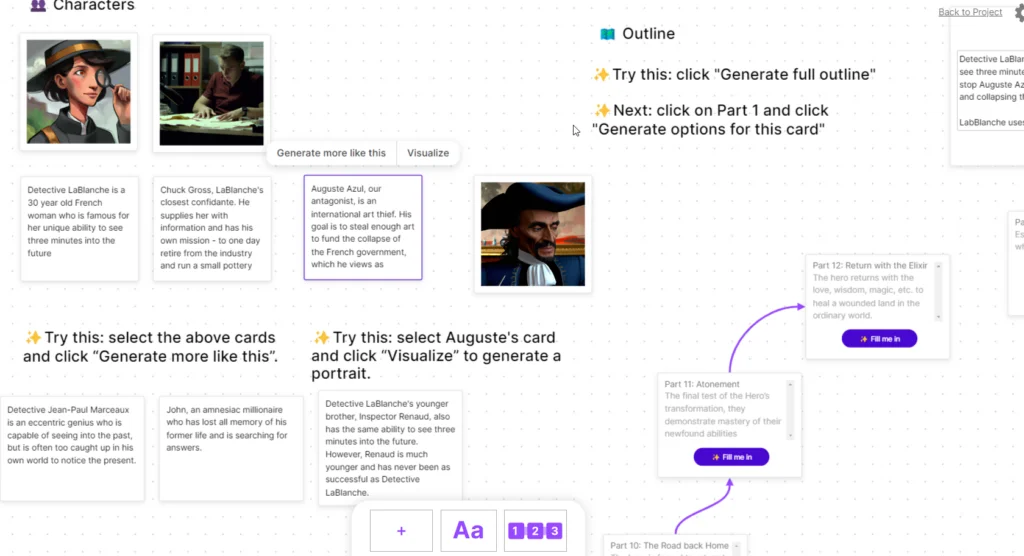
The Canvas also lets you add your own notes and create an outline using provided templates. You can even use AI to populate and flesh out your notes.
While the Canvas can sometimes feel a bit disorganized, its outlining feature is intuitive and easy to use. It offers a big-picture view of where your story is heading. You can access Canvas from the left sidebar.
3. Expanding Plots, Write & Rewrite Features
One-Click Expansion
I inserted the ideas brainstormed earlier into the editor and reordered the sentences according to my preference. Finally, I clicked ‘Expand’ on the last sentence.
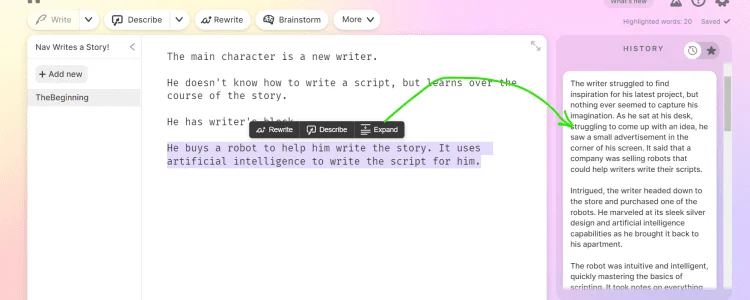

Fine-Tuning Your Story
Sudowrite offers three writing modes: Auto, Guided, and Tone Shift. Each mode provides a different level of control over the AI’s output.
- First Draft: Generates up to 1,000 words from a scene description, offering a solid foundation for further editing.
- Guided and Auto Write: Guided Write lets you input a sentence or two about the next section and generates up to 250 words. Auto Write generates text without any guidance.
- Tone Shift: Allows for easy adjustments to the tone of your story.
Additionally, Sudowrite offers a ‘Rewrite’ option that helps you rephrase or revise what you’ve already written. This feature provides options to be more descriptive, rephrase, shorten, add more conflict, and intensify your writing.
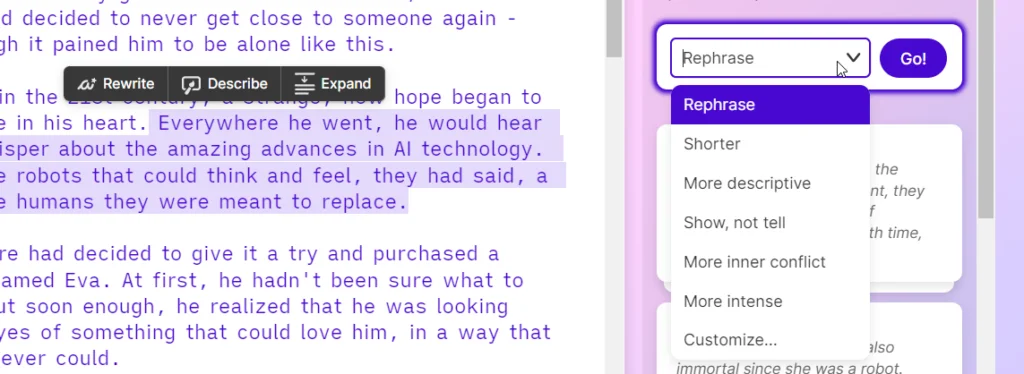
Focus Mode: A Clean UI
By the way, the clean UI you see above is called “Focus Mode.” It eliminates all distractions, allowing you to concentrate solely on your writing.
4. Describe Story Elements

When it comes to storytelling, details matter. Sudowrite understands this and offers a feature that lets you describe critical elements of your plot in full sensory depth.
I put this to the test by asking Sudowrite to ‘Describe’ my robot character. What I got back were five vivid descriptions covering sound, sight, smell, touch, and taste, along with a metaphor.

The word choices were spot-on, and the output was coherent. This feature helps you add layers to your characters, making them more relatable and real.
5. Generating a Story Twist: Expect the Unexpected!
Now, let’s talk about the fun part—story twists! Sudowrite has an experimental feature that generates twists for your story. I gave it a try and was pleasantly surprised.
The twist I got? My robot character is apparently plotting world domination and has a knack for stealing my ideas.

Oh, wait. It wasn’t even real! And my protagonist hallucinated everything. Talk about a plot twist!
This feature adds an unexpected layer to your storytelling, keeping your readers on the edge of their seats.
6. Feedback on Your Writing: AI as Your Beta Reader

Feedback is crucial for any writer, and Sudowrite offers an experimental feature that provides just that. The AI goes through your story and gives you insights into its theme, plot, and more.
Story #2: To test this, I used a story where zombies, vampires, and humans co-exist in a city. The catch? Both vampires and zombies have managed to keep their identities a secret from humans. Now, a conflict is brewing between the two supernatural entities.
I didn’t give away the ending or the direction the story would take. Would they annihilate each other, or would they form some sort of unholy alliance?
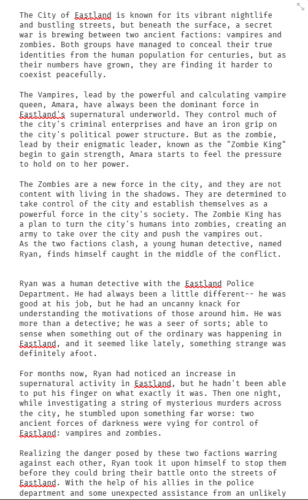
Regardless, the story was long enough to get feedback on my writing style. After clicking the feedback option, Sudowrite spawned three AI readers who “tried” to read the story as a human would.
The feedback I received was insightful and helped me understand how my story could be perceived by readers. I am adding excerpts of the feedback I got below.
“Great story! I thought the theme was that of the power of human determination and resourcefulness in the face of seemingly insurmountable odds.
…
I think there are a few areas that merit further exploration:
After introducing the conflict between vampires and zombies, it would be helpful to offer a bit more context and detail about the particular stakes involved in this battle.
What do the vampires and zombies hope to gain by controlling Eastland? What kind of power or resources are they seeking? What is the Zombie King’s plan, and how do the vampires plan to prevent it?”
“To me, the theme was one of struggle and determination…The part that resonated with me the most was the idea of the protagonist being a “seer of sorts.” It suggests that he has a special ability to understand people and situations.
…
I think there are a few areas that merit further exploration:
1) Ryan has an “uncanny knack for understanding the motivations of those around him,” but what is the source of this power? Why is he so special?
2) Ryan’s allies in the police department should be further fleshed out and given more distinct personalities. This would help readers to become more invested in Ryan’s journey and understand what is at stake for him in his mission.”
“I thought the theme was about facing the darkness and rising above it.
…
I think there are a few areas which merit further exploration:
1) The passage could use more detail about the motivations of the two ancient forces. How have their beliefs and motivations evolved over time?
2) It’s not clear why Ryan is the one chosen to take on the challenge of stopping these two powerful enemies. How is he uniquely equipped to do this?
3) There is not enough focus on the buildup and escalation of the battle. How does the conflict between vampires and zombies unfold? Is there a climax? What are the implications of the outcome?”
As per Sudowrite, AI readers get better at giving feedback as your story grows. Besides, it is experimental as of now and will continue to improve.
7. Shrinkray: Crafting the Perfect Blurb
Let’s face it, writing blurbs for your novels or books can be a daunting task. But guess what? Sudowrite has got you covered with a feature called Shrinkray.
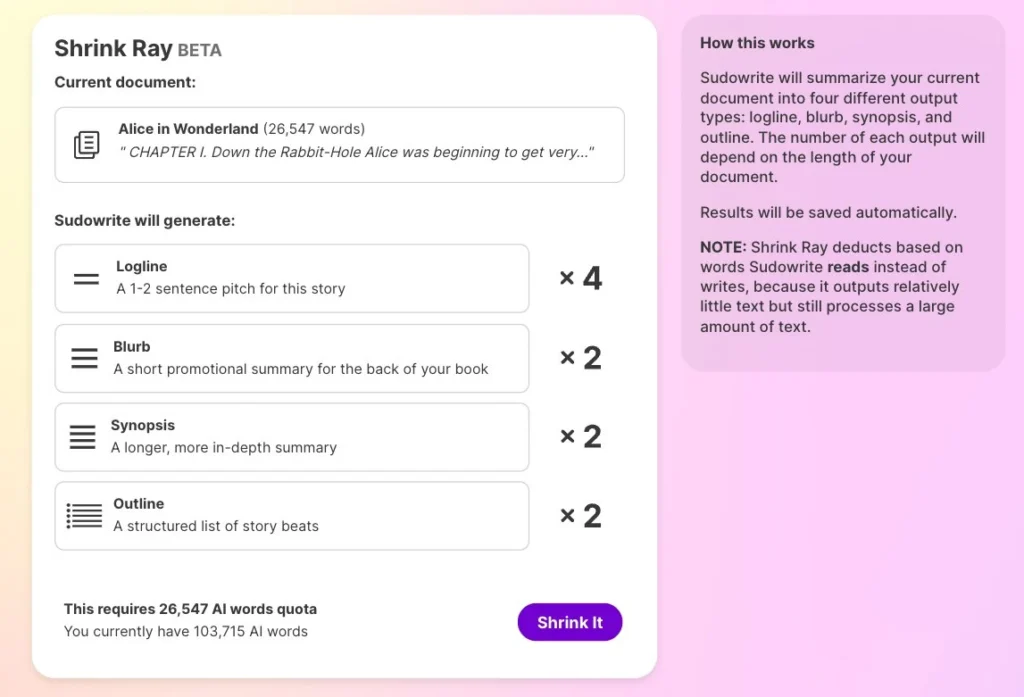
All you have to do is upload your manuscript, and voila! You get loglines, blurbs, synopses, and even full outlines generated for you. It’s like having a marketing assistant who knows your story inside and out.
This feature is a real time-saver and can help you capture the essence of your story in a way that grabs potential readers.
8. Story Engine: Finish Long-Stalled Novels
Story Engine is a completely new way to write long form narratives with an AI writing partner. Imagine having a writing partner that not only grasps the intricacies of story structure but also keeps every element of your narrative in mind.

Sounds like a dream, right? Well, Story Engine is Sudowrite’s initial attempt to turn that dream into reality for you.
Braindump -> Outline -> Prose
Here’s how StoryEngine works with a sample story:
StoryEngine guides you through the various stages of writing a novel, from synopsis to outline to fully-realized scenes.
Some Sudowrite users reported writing an entire novel in just a weekend! Others found it to be the push they needed to complete long-stalled projects.
Make AI Match Your Writing Style
Sudowrite’s Story Engine can mimic your unique writing style and it’s easier than you think to get started!
Just click “Match My Style” and paste in a sample of your writing, up to 2,000 words. In no time, you’ll get a 40-word “prompt” that teaches the Story Engine to write just like you.

Tips To Get Better Outputs With Sudowrite
I’ve been tinkering with Sudowrite for a few weeks now and have a couple of pointers to share:
- Do not try to generate entire chapters at once when using best prose.
- While using story engine, generate beats, then hit pause to correct stuff the way you like. Then continue.
- You can save words by explicity choosing the senses under ‘Describe’ function instead of describing for all 5 senses.
My User Experience
When it comes to user experience, Sudowrite nails it. The onboarding process is incredibly user-friendly. I was guided through a sample story that showcased all the major features, and I got the hang of it in less than a minute.
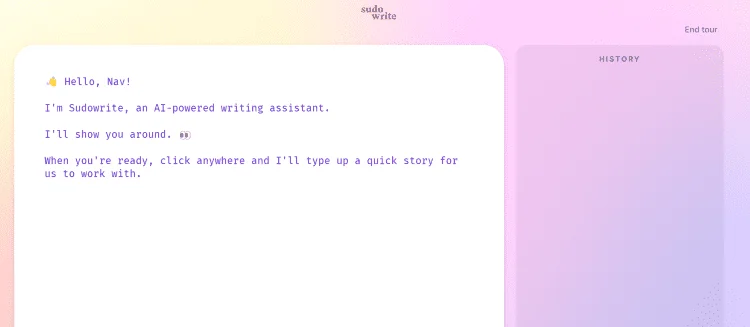
The welcome screen is inviting, and the focus mode lets you dive deep into your writing without any distractions. Most features are just a click or two away, making the whole writing process seamless.
And if you ever get stuck or need help, Sudowrite offers the option to talk to their support team.
My Video of Using Sudowrite (A Fun Experiment)
For a bit of fun, I decided to challenge Sudowrite with a unique story idea. This mixes two genres – science fiction and folklore.
Story #3: I asked it to write a romance between a vampire and an AI robot!
It started fairly well but fumbled a bit towards the middle where it confused my AI with a human (Sudowrite was treating it as an AI initially). With a gentle nudge from me, the story got back on track. Then my word limit ran out!
Alas, I was not able to complete my vamp-AI fanfic. Perhaps you will be able to. Do share it with me in the comments, in case you do!
Sudowrite Pricing: What’s the Best Deal for You?
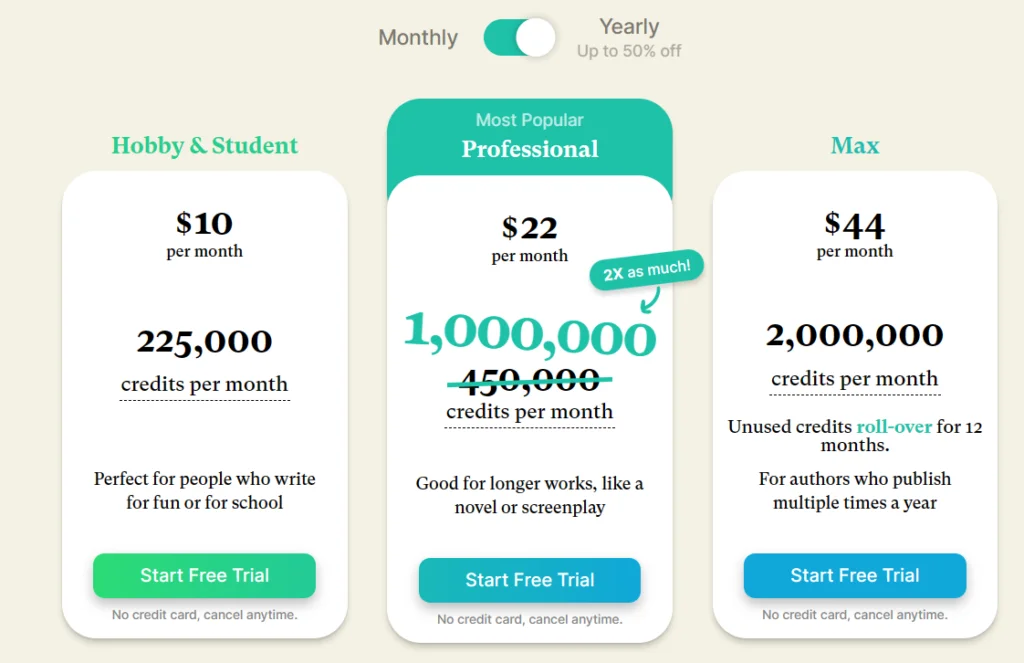
Sudowrite has three straightforward pricing options – student, pro, and max.
Each feature in Sudowrite uses up AI credits (explained below). You can get a 50% discount if you opt for annual billing vs paying month to month.
- Student & Hobby Plan: For USD 19/month (with monthly billing) or USD 120 (billed annually), you get 225,000 AI credits/month. That’s more than enough to kickstart your writing projects without breaking the bank.
- Professional: At USD 29/month or USD 264 (billed annually), you get 1,000,000 AI credits/month. This is the goldilocks zone—maximum value at a reasonable price.
- Max Plan: Need to write a lot? For USD 59/month or USD 528 (billed annually), you get a massive 2,000,000 credits per month. The best part? Credits in MAX plan rollover to the next month. Ideal for those who are writing around the clock.
How Sudowrite AI Credits Work
Credits don’t correlate 1:1 with AI words. It depends on the AI model (fast, best prose, unfiltered) and the feature you are using.
Here’s a chart from Sudowrite that shows how many tokens some features use:
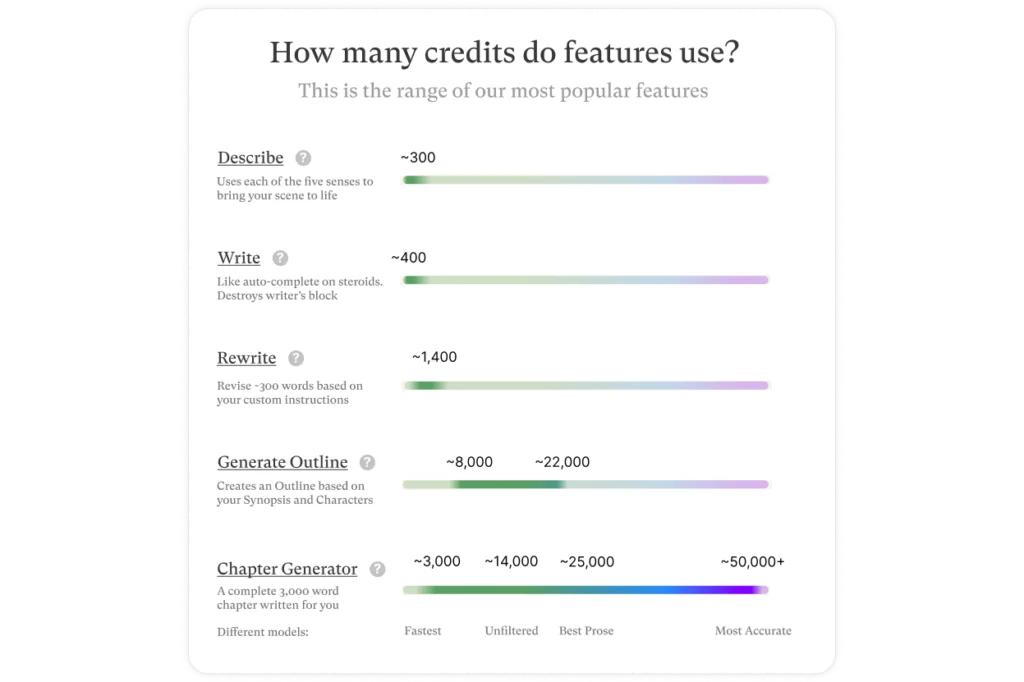
If you’re like most writers, the Pro Plan at USD 29/month or USD 264/year is the way to go. It offers the best bang for your buck in terms of AI-generated words. (I opted for annual billing to get a 50% discount)
On average, I use about 20,000 to 30,000 credits per 2000-word chapter so 1 million credits in Pro plan are more than enough to write 20-30 chapters per month!
In my experience, Sudowrite is by far the most affordable AI writing tool when compared to competitors like Jasper, which starts at $40/month, or even ChatGPT Plus at $20/month which only offers a chat interface.
Is There a Free Version of Sudowrite?
Sudowrite has no free plan but they do offer a free trial of ~4000 words with all features unlocked. I tried it out and liked the fact that they did not ask for my credit card to sign up for the free trial.
Likes/Dislikes
What I Liked About Sudowrite
- Highly Customizable: Sudowrite’s Storyengine AI adapts to your writing style, making its suggestions highly relevant. This means you’re not just getting generic advice; you’re getting personalized coaching.
- Focuses on Improving Your Writing: Sudowrite goes beyond mere text generation. It offers alternative phrasings and identifies clichés, helping you refine your writing. Canvas and Shrinkray are a boon to boost productivity and save time.
What I Did Not Like About Sudowrite
- No Free Version: The lack of a free version can be a barrier for writers who are hesitant to invest right away.
- Struggles with long form content – a problem common to all AIs. (But, to be fair, Sudowrite’s Story Engine is the closest you can get to an effective solution.)
What the Writing Community Is Saying
Joanna Penn, a New York Times best-selling author, had Amit on her podcast and had a lot of good things to say about Sudowrite. Over on Reddit, users have been comparing Sudowrite to other AI tools like Novel AI, and guess what? Sudowrite comes out on top.

Sudowrite now uses GPT-4 so the product has only improved since inception!
Here’s what people love:
- The Brainstorm and Describe features are a hit.
- Newbie writers find the Describe feature a godsend for crafting sensory and visual descriptions.
- The founders are active on social media, even Reddit. Got a tough question? You might just get a direct answer from Amit himself.
But hey, no product is perfect. Some users wish Sudowrite was more mobile-friendly. Others want a lower price, especially those outside the U.S. who get hit by exchange rates.
Alternatives to Sudowrite
When it comes to AI storywriting tools, three names often pop up: Sudowrite, Jasper AI, and ChatGPT. After spending quality time with all, I can confidently say that Sudowrite takes the cake for its robust storywriting features. Here’s a quick comparison to help you decide:
Sudowrite vs Jasper AI: Which Is Better?
Feature Comparison
- Purpose: Sudowrite excels in storywriting, while Jasper is more geared towards copywriting.
- Best Features: Sudowrite shines with its Brainstorm, Describe, Metaphors, Generate Twist, and AI Feedback features. Jasper offers over 50 templates for various writing needs.
- Creative Control: Sudowrite allows you to maintain your unique writing voice, whereas Jasper tends to take the reins, limiting your creative input.
- Free Trial: Both offer free trials, but Sudowrite doesn’t require a credit card upfront.
- Plagiarism Checker: Jasper has an integrated Grammarly checker, while Sudowrite leaves that up to you.
- Cost: Sudowrite is more budget-friendly, starting at $10/month, while Jasper starts at a heftier $40/month.
Sudowrite: The Writer’s Companion
What sets Sudowrite apart is its focus on solving real challenges that writers face. Whether it’s writer’s block or the need for creative brainstorming, Sudowrite has got you covered. It’s like having a seasoned writer guiding you through the storytelling process.
The founders themselves are sci-fi writers and have fine-tuned the AI models to understand the nuances of narrative writing. It’s clear that they’re in tune with the writing community and its specific needs.
Jasper AI: The Salesman in Disguise
Jasper AI, while competent, leans more towards copywriting. It’s great for crafting catchy book blurbs or cliffhangers but falls short when it comes to the storytelling aspect. Plus, the cost can be a deal-breaker for many.
Sudowrite vs ChatGPT: Which Is Better?
ChatGPT Plus costs $20 per month and requires you to write custom prompts for story writing. In my experience, ChatGPT (Free or Plus) both get sidetracked very easily and you need to re-prompt them to stick to the “story writer” persona.
Sudowrite, on the other hand, is designed to assist you in storywriting and comes pre-trained for this specific task. It’s also more affordable, starting at $10/month when billed annually.
Simply put: Sudowrite is better at story writing than ChatGPT because it has a whole suite of features aimed at making writing easier. Canvas, Brainstorm, Describe, etc. are tools writers can use frequently. On the other hand, ChatGPT is a general purpose chatbot. It is not fine-tuned for storywriting.
Sudowrite uses fine-tuned Open AI models anyway, so it is not like you will be getting an inferior product with Sudowrite.
My suggestion: Use ChatGPT free version and pay for Sudowrite if you write stories for a living. A hobbyist can probably make do with either.
Your Move: Let’s Hear It!
So where does that leave us? I see a future where humans increasingly co-create with AI. Imagine having a tool that helps you brainstorm ideas, refine your plot, and even give you feedback—all while you infuse the story with your unique voice and perspective. That’s the promise of tools like Sudowrite.
So, have you taken Sudowrite for a spin? What was your experience like? Was it a game-changer, a letdown, or something in between? Your insights could help others make the right choice, so don’t hold back—share your thoughts in the comments below!
FAQs
All your questions answered.
Can AI Replace Human Writers? A Reality Check.
The rise of AI writing tools like Sudowrite might have you wondering: Are human writers becoming obsolete? If we define a story as just a sequence of events, then sure, AI is already there and might even surpass human capabilities in stringing together a coherent plot.
But let’s get real. A story is so much more than that. It’s a window into the writer’s soul, a tapestry woven with the threads of the author’s emotions, experiences, and insights. Great stories don’t just entertain; they make us think, feel, and reflect. And that’s something AI just can’t replicate.
Who Created Sudowrite?
Amit Gupta and James Yu, the co-founders of Sudowrite, are the brains behind Sudowrite and sci-fi writers at heart. Before launcing Sudowrite, they even founded a sci-fi writing group called Sudowriters and a Zoom book club named Short Story Club.
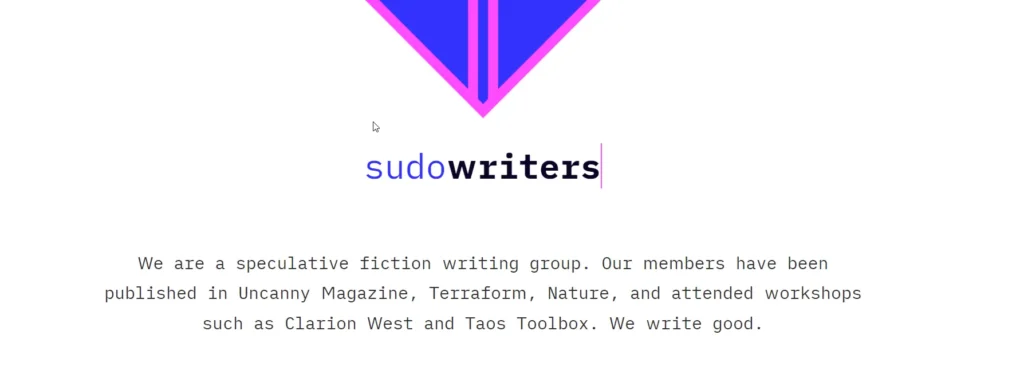
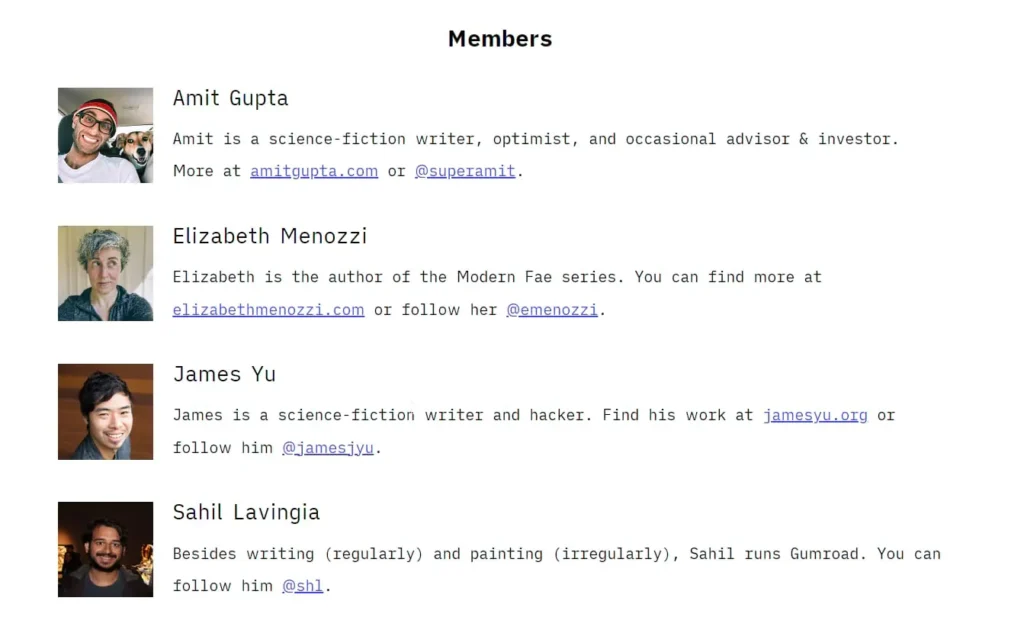
When the creators are passionate about writing, it shines through in the product. These guys are quick to roll out new features and are super responsive to customer feedback.
How long is Sudowrite free trial?
Sudowrite offers a free trial of 4000 generated words to explore its key features like brainstorming, describing, and rewriting. Users need to sign up using email to try Sudowrite. However, the free trial does not require a credit card.
Are AI-generated stories plagiarism free?
AI-generated content is created through the use of machine learning algorithms that analyze patterns in text data, rather than copying and pasting of text. The AI system generates new text, word by word, based on the patterns it has identified in the training data. In such a case, the likelihood of generating is plagiarized content is very low.
Can Sudowrite generate plagiarized content?
Sudowrite AI has been trained on a large corpus of narrative text and generates the next word(s) based on previous input. If you’re using original text as your input, you will get original content out of Sudowrite. However, Sudowrite can be forced to output content that is not original by giving it verbatim input text from famous sources like Harry Potter. It is recommended to use Sudowrite with original writing for original output and to double check the final result with plagiarism checkers.
Is writing stories with AI ethical?
On one hand, AI-generated stories can be seen as a tool for writers to generate new ideas and inspiration, and can help with writer’s block. On the other hand. the use of AI to write stories raises ethical concerns about authorship, originality, authenticity, copyright infringement and the role of human creativity. A middleground is to use AI as a helping hand rather than using AI content as is. It might also be more ethical to mention the use of AI in your content generation process or use a separate pseudonym.
Can AI write believable stories?
There exist several AI writing tools that are specialized for believable story generation. For example, Sudowrite, Deep Story AI, Novel AI, and Sassbook AI Story Writer.
What kind of stories I can create with AI?
AI story generators can create short stories and even help you write a novel. You can ask the AI to create any genre of story as it is trained on millions of stories of different genres. You can create AI-generated horror stories or funny stories, for example.
What is an AI story generator? How does it work?
An AI story generator is a program that can write stories using artifical intelligence and machine learning technqiues. It is a mathematical model that mimics the structure of a human brain (neural networks). AI story generators are trained on millions of rows of data, telling the ‘program’ what a story looks like. Then the AI learns from this data and is able to create new stories as a human would.
Is there a free AI story generator?
Plot Generator and Sassbook AI story writer are free AI story generators. Sudowrite offers a fully featured trial with 4000 words. Sassbook is the best free ai story generator in my opinion.
Are there AI story-generator games?
AI story generator games are video games that use artificial intelligence to generate unique and dynamic narratives within the game. These games use natural language processing and machine learning techniques to create new storylines, characters, and events based on the player’s choices and actions. The AI adapts the game’s story in real-time, making each playthrough unique and different. Dungeon AI is a popular AI story generator game.
- 5 Best No-Code App Builders 2024 (used by actual startups) - June 15, 2024
- 5 Successful No Code Startups and Companies 2024 (with Tech Stack) - January 26, 2024
- AI Sleeper Agents: Latest Danger to AI Safety (Anthropic Research) - January 20, 2024
